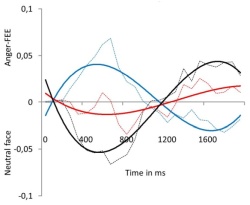Power-motivated people avoid angry faces
Research conducted at the HuMAN Lab suggests that people with a strong power motive avert their gaze from angry faces. Using eye-tracker technology in two studies with over 260 participants, Kevin Janson and his team presented pairs of angry and neutral faces on the computer screen and determined where participants looked first. They found that individuals with a strong power motive, as assessed with a picture-story measure, more frequently looked “the other way” -- away from the angry face and towards the neutral face -- than individuals with a weak power motive. Says lead researcher Janson: “Power-motivated individuals behave adaptively. They avoid challenges and the potential fights that come with them whenever they can. However, that should not be taken to mean that they will avoid challenges at all costs. At some point, they are likely to engage and actually look at the challenger. I suspect that this happens when the challenge is persistent and relevant enough.” Adds Oliver Schultheiss, co-author of the paper, which was just published by Motivation Science: “I am glad that we see the gaze-avoidance effect with eye tracker technology. This allows us to measure rather directly where people allocate their attention. In a previous study, we obtained similar findings, but with a more indirect method that left some key questions unanswered. Kevin Janson’s findings are a big step forward in terms of showing that the effect is real and replicable.”
|

The figure shows the likelihood of looking at an angry or a neutral face separately for high-power (red lines) and low-power (blue lines) participants (black lines = difference between high- and low-power participants)..
|
Are women more verbally fluent than men?
Discovery of a potential new indicator of pubertal hormone levels linked to human power motivation
What motivates you as an adult may depend on the hormones you were exposed to as a fetus
David Winter presents talk on the roots of war
Competition, aggression, and hormones
Women are more affiliation-motivated than men
Why the power-motivated are better at parking their cars
New meta-analysis: Low to no correlation between implicit and explicit motive measures
Content-coding motive measures can be approcimated with automated word counts
Exploiting the full potential of thematic apperception through profile analysis
High progesterone is associated with less coherent brains (August 2012)
What color naming speed reveals about the wisdom of
one's goal choices (December 2010)
Are you high on testosterone and is that a good thing? Listen to Podcast of interview with Dr. Oliver Schultheiss on UM NewsService
New edited book on implicit motives available (October 2009)
What the word "not" may reveal about your ability to handle stress (October 2008)
Estrogen fuels female power (February 2008)
High-testosterone people reinforced by others’ anger, new study finds (February 2007)
Study finds US students more motivated to achieve, less power-hungry than German students (August 2006)
Are all people stressed out by a defeat or does it hurt some more than others? (April 2006)
|

